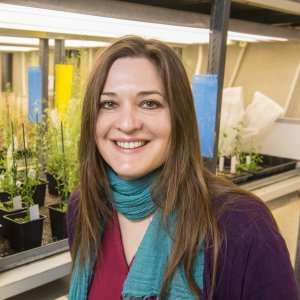
Research in the Charpentier lab addresses how plant cell nuclei integrate environmental stimuli to generate specific calcium signals that reshape plant responses to biotic, abiotic, nutritional, and developmental cues.
Specifically, the lab has discovered that calcium is released within root cell nucleoplasm, not only in response to biotic stimuli but also in response to developmental stimuli, and is associated with root development. In addition, the activation of nuclear calcium oscillation in root cells is essential for the establishment of root endosymbiosis with nitrogen-fixing Rhizobia and phosphate-delivering arbuscular mycorrhizal fungi. These root endosymbioses are highly beneficial to plants as they enhance nutrient uptake and stress resilience, playing a crucial role in optimizing plant performance and productivity, and ultimately contributing to sustainable agriculture and ecosystem health.
Within the Advancing Plant Health ISP, the Charpentier lab aims to advance our understanding of plant symbiotic interactions by dissecting the molecular encoding and decoding mechanisms of nuclear calcium signalling. Ultimately this knowledge will facilitate the rational modification of agronomically important plant species to enhance their performance while preserving the environment.
The lab’s research focuses on the following questions:
- How do environmental stimuli induce plant nuclear calcium signalling?
- How do nuclear ion channels generate calcium signatures?
- How are different calcium signatures decoded?
Selected Publications
-
Charpentier M, Del Cerro P, Cook N, Huisman R, Dangeville P, Grubb L, Marchal C, Lam (2022)Engineered CaM2 modulates nuclear calcium oscillation and enhances legume root nodule symbiosisProceedings of the National Academy of Sciences of the United States of America (29)Publisher's version: 35324326
-
Leitão N., Dangeville P., Carter R., Charpentier M. (2019)Nuclear calcium signatures are associated with root development.Nature communications (10)Publisher's version: 2041-1723
-
Kelner A., Leitão N., Chabaud M., Charpentier M., de Carvalho-Niebel F. (2018)Dual Color Sensors for Simultaneous Analysis of Calcium Signal Dynamics in the Nuclear and Cytoplasmic Compartments of Plant Cells.Frontiers in plant science (9)Publisher's version: 1664-462X
